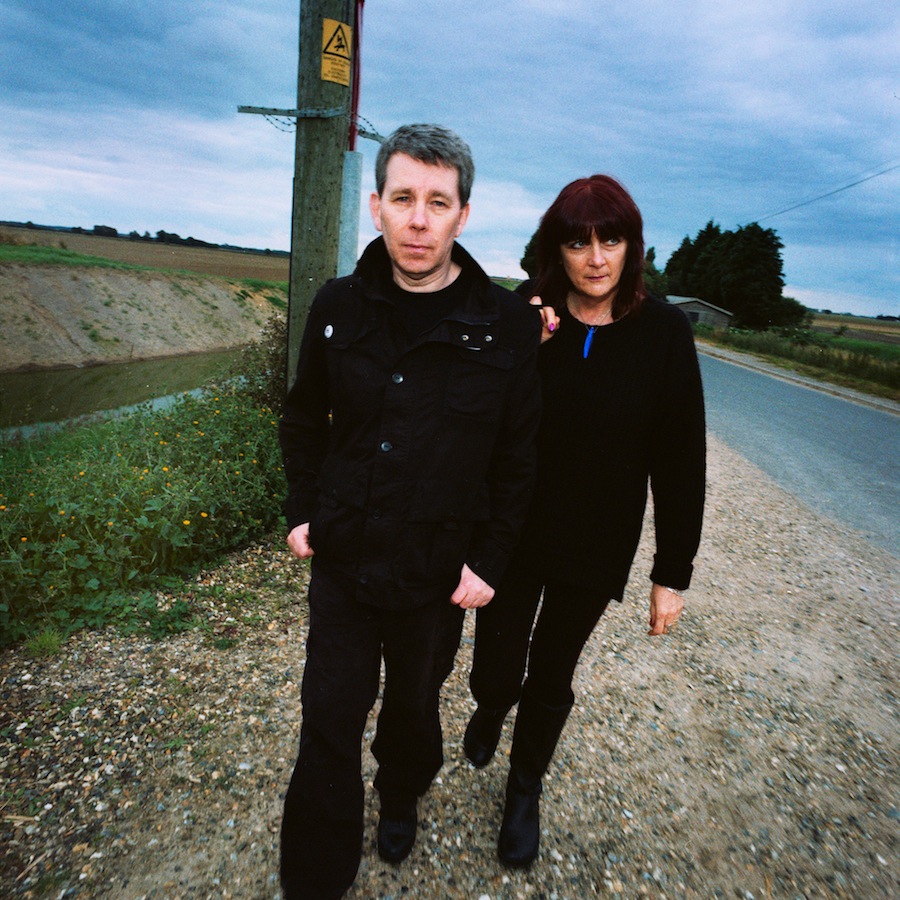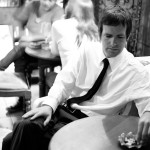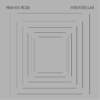Words by John Doran
Chris & Cosey were known as the Peters and Lee of the long overcoat brigade or the Sonny and Cher of the suicide set depending on which British ‘inkie’ you read during the early ’80s. However, these tags tell you more about the tabloid interests of the English music press than they do about one of the most enduring creative partnerships in experimental/electronic music of the last 36 years.
Cosey Fanni Tutti (Christine Newby) had originally been a member of the Hull-based radical performance art group COUM Transmissions with then partner Genesis P-Orridge between 1969 and 1978. During 1976, the pair formed the self-styled industrial group Throbbing Gristle initially for the infamous Prostitution show at the Institute of Contemporary Arts in Central London, with their lineup rounded out by Peter ‘Sleazy’ Christopherson and Chris Carter. During the five year course of the group Chris & Cosey became a couple and started recording under that very name soon after TG’s termination.
After the release of their first album (Heartbeat) in 1981 and the birth of their son Nick, the pair swapped the intensity of urban life for a renovated schoolhouse in the wilds of Norfolk, complete with home studio. This is where the couple still live and record (although more often as Carter Tutti these days) and after the reformation of TG in 2007, it was also where they planned to record new material. This idea was scuppered however when P-Orridge walked out on the group late in October 2010. The three remaining members formed a new off-shoot band called XTG to meet gig commitments but sadly Christopherson died in his sleep less than a month later.
Chris & Cosey have continued with several of TG’s projects, including an excellent reissue series of the band’s main albums and plans for a live performance of remixed reinterpretations of tracks from Nico’s Desertshore album at a concert held in tribute to Christopherson. Late March also saw the release of the Transverse album, a live document of the stunning collaboration between the couple and Nik Void (guitars/electronics/vocals) from Factory Floor. The trio wrote four 10-minute pieces to be performed as part of Mute Records’ Short Circuit festival held at Camden Roundhouse on Friday 13th May, 2011.
The following is the first part of self-titled‘s lengthy interview with the iconic couple…
When you play music together that’s very abstract–like your new Transverse record–do you have means of visualizing it or do you have a special language to discuss what you’re doing?
Cosey Fanni Tutti: No. That’s just how we make music I guess. We’ve always made music in the same way so it’s never been analysed to that degree. It’s always been sound driven. We’ve never sat down and come up with a concept as such. It’s more that concepts and projects have presented themselves, which is what happened with the whole Carter Tutti Void project–it was triggered by Mute asking me and Chris to do something for their festival. They said they wanted lots of artists to collaborate and it would be nice if we could collaborate with someone else on Mute and that’s where it came from.
I’ve seen Factory Floor more than any other group live but even by their own standards one of the best gigs was the show they put on at Cosi Club at the ICA in London. Was that the first time you saw them live?
Chris Carter: Yeah, it was. It was also the first time we really met and connected with them as well. And yeah, it was a brilliant gig, I have to agree. It was the best gig of theirs that I’ve seen. At that time we had the same manager (Paul Smith of Blast First Petite) and he introduced us. And we just made a connection. We don’t often do that, so it was a bit weird. And we didn’t meet them until after they played, so that was odd. I’m not sure how it would have gone if we had have met them before. We may have been a bit more standoffish. But seeing them do what they do live we were very, very impressed and we went backstage to chat with them and there was this instant connection with them. We were just saying how much we admired what they were doing reminded us of TG. It didn’t sound like TG, it was just their attitude, their approach and the way they played, I guess.
That gig was fundamental to me in coming to see them less as a noise band and more as a dance act. There were a lot of tribes there that night–art people, goths, industrial types and even a bunch of ravers, presumably attracted by the presence of Andrew Weatherall, who was DJing. And it really made me think about what a TG/Chris & Cosey fan is as well. Do you find that your work has always attracted a weird cross section of people?
CFT: [Laughs] You can’t really say that the way people dress is going to give you a clue to what sort of people they are…especially not now and especially not the sort of people who come to our gigs. If anything, I think they like to operate under the radar and I think that’s really why the audience look so eclectic at our shows. It’s because they’re very different people underneath the ‘disguise’ of what clothes they’ve got on.
That’s a very fair point. You’ve mentioned that you saw a similarity between what you saw Factory Floor doing and what TG used to do. I was wondering if you could expand on that. Did you find that in the run up to the gig Nik used similar methods to yourselves to make music?
CFT: It was seeing them on stage and the fact that they had their heads down and the fact that they were focussing on working with each other. It wasn’t about performing in the usual sense of the word and that’s what the similarity was with TG. And the fact that they weren’t afraid to let the track find itself instead of going straight into the intro, the hook, the verse, the chorus, the conclusion:That’s what struck us. It was the same thing that we experienced with Emeralds after watching them in America when TG were touring over there. That was also a really refreshing thing. You don’t often find that, especially in younger bands.
While I’m a major heavy-metal fan, the one thing I really hate about the genre is the really virtuoso, meandering, masturbatory guitar solo, so it was really refreshing to see both you and Nik on stage, really mistreating your instruments.
CFT: [Laughing] Yes.
Is it true that you first picked up the guitar because you felt it was the instrument that you were least qualified to play?
CFT: Well, yeah, I suppose it was really. Early on, when I was a teenager, a lot of my friends were in bands and it was normal to have guitars lying around. People would have acoustic guitars and people would just be playing music while you were sat ‘round talking, so it was an everyday thing for me but I never actually played the guitar myself. I mean the closest friend I have who I have known since the age of four is fantastic on guitar but it never occurred to me to ever try and learn to play it because it just looked too complicated. I knew that I wouldn’t really be into playing chords and all the rest of it.
CC: You started on piano didn’t you?
CFT: I started on piano. But even as an 11-year-old girl I played it more like a prepared instrument; I’d always want to take the top off and have a look inside. So that kind of attitude towards instruments has always been there for me. I remember when I would go down Tottenham Court Road to Macaris and asking for all these different pedals to try out and I think the men in the shop expected me to do a lick from Led Zeppelin.
CC: ‘Stairway To Heaven’!
CFT: Yeah! But really all I was interested in was what racket that pedal would afford me if I hit the guitar with a screwdriver. I used to use a screwdriver a lot in TG. But yeah, I would use the guitar as a percussion instrument or as an instrument to get the sound I could hear in my head on that particular night. It’s about the sounds and how the sounds fit together. When we were in the studio with Nik getting ready to do the show I held back from my guitar to see what she felt she could contribute with hers. I knew where it would stand guitar wise for the both of us.
CC: I think there was an element of that from her as well.
CFT: She was as well. It really is a threesome. It has nothing to do with one person posturing with a guitar and being the loudest.
Yeah, it’s certainly not Frampton Comes Alive.
[Both laugh]
I was lucky enough to get into the room early and get a good spot for the gig. The atmosphere in the audience was electric; everyone was getting into it in their own way. It might sound a bit trite but I was just wondering to what extent you feed off this, especially given that there’s an improvisational aspect to what you do.
CFT: Mmmm. Yeah, the atmosphere was so intense in there…but in a positive way. Like you said, that atmosphere was electric but in the most fantastic way, to the extent that it almost distracted me from what I had to do. [Laughs] You can get feedback that is so intense that you can get drawn into it when you’re the actual focus of it. You’re there to provide a starting point for everyone and I remember thinking at the time–’I need to get my head down and do this’. But it certainly helped. An audience like that is amazing.
CC: Yeah, it did help drive us forward.
When did you decide to release it as an album and what did you need to do to the recording to make it release worthy?
CC: We knew it was being recorded and within a few days Mute had sent us a copy. It was such a good recording we thought, ‘People have to hear this.’ It was partially because the doors were closed on the venue and there were only a few hundred people in the room–there were so many people outside the room who didn’t get to hear it. So we thought we would have to release it to get it to a wider audience. The mix on the album is exactly what Mute recorded:
CFT: :as it was on the night. And I felt that I really wanted it as a document, however simplistic it might be. It harks back to early TG days when we documented everything we did.
It does my head in that Factory Floor don’t record their gigs. Some of the live shows I’ve seen them do have been some of the best gigs I’ve ever seen and there is no document of them. It’s such a sensible thing to do.
CC: I agree entirely.
Speaking as a British journalist who was 9 or 10 when TG originally split up, it was a really big deal for me not just to get to see the group live a handful of times [during the 2004-2010 reformation] but also to properly get to grips with the back catalogue, which is what happened when the reissues came out recently. I was wondering did the idea of the reissues come about recently or had it always been the intention after you reformed?
CFT: We discussed it the year before because we reactivated Industrial Records and our contract with Mute/EMI was coming to an end. We said that what we wanted to do was to reissue some of the vinyl and we discussed it between the four of us and we said that we had to wait until we were out of contract to do that. And we were working on that when Sleazy died actually, because he was going to do the artwork and Chris was going to do the audio. But as things happened we ended up having to do everything because of him dying. But yeah, it was already in the pipeline along with Desertshore and three other TG projects that we were supposed to be doing over the next few years. It’s not a posthumous reissue project for profit making at all.
“Being described as shit by your own lead singer is really good!”
Now I know that internal tensions acted as a dynamo even back in the day and I dare say these internal stresses and strains were still present after you reformed but at what point did you realise that it was simply untenable?
CC: When Gen walked out.
CFT: Yeah, obviously when Gen walked out and left us with a load of gigs to do, with tickets having been sold and disappointed and irate fans and promoters.
CC: But it was building to that point.
CFT: Yeah, it was building to that point. There were difficulties because we were all in different parts of the world. But Sleazy would come here to Norfolk and do a lot of work with us here in the studio. So the rapport and the music and the sounds that we did with him was always an utter pleasure. But Gen wasn’t always available, or willing [to make himself available] or simply didn’t have the [inclination to] input any more.
CC: It was a divided camp, I suppose. There was us three on one side and Gen on the other. And there was some resentment on both sides I think. Us towards Gen because he wouldn’t give it his all sometimes and Gen towards us because he felt excluded sometimes. And the tension because of those factors grew and grew. Having said that, the tension made for some really good gigs as well.
Chris, I’m pretty sure I read somewhere that you said the last gig you played in America (San Francisco in 1981) was one of the best gigs you ever played:
CC: It was yeah.
You said that the last gig of the TG reformation (London in 2010) was one of the best as well. How would you compare and contrast both gigs?
CC: Erm, ha ha ha. Struggling through in both cases I think! I think the last gig was San Francisco, and I think if you’ve seen any clips from Village Underground or heard any audio, you can tell why it was such a good gig. We were just coming up with lots of different things. I felt slightly sorry for Gen, which is quite unusual, because we were throwing all this new stuff into the mix which he hadn’t heard and had had no input on.
CFT: He chose what happened though because we arranged a rehearsal room and he chose not to come to rehearsal.
CC: So we were coming up with all this new stuff and he couldn’t really connect with it, which made for a really interesting show I think.
CFT: What was it he said? Oh yeah, ‘The people seem to really like this shit you’re doing.’
CC: Oh yeah, being described as shit by your own lead singer is really good! Gen basically spent half the gig sitting down and drinking his bottle of wine. He just sort of got on with it.
CFT: I think when the three of us finally met up to do the last shows that year, it was obvious that Gen was disconnected from us. And at that point, all three of us being disconnected and frustrated over the grouping over the lack of contributions and lack of willingness to move into new territories. Which I particularly wanted to do at the Village Underground and yet again Gen was unwilling to do that. He was just bankrupt for ideas as to what to put with the stuff that we were doing. So it was a precursor to XTG to be honest.
How far did you get with XTG?
CC: We did two shows and a whole bunch of studio recordings.
Sleazy’s death must have come about as a very bad shock to you both. How difficult was it to press on with the reissues, given all the archive material you had to look through?
CFT: It was difficult at first because we had the studio set up for Sleazy coming back.
CC: It was a very emotional time.
CFT: He was due back here at the studio 10 days after he died because we were due to play ATP with XTG. We had all the stuff set up in the studio set up for him exactly as he’d left it. So that was weird–knowing that he would never come back to use it again. But yeah it was difficult going through the old photos, wasn’t it?
CC: It really was, because it was such a long project–looking through all that stuff. To be constantly reminded that he wasn’t with us any more when looking at pictures that he’d taken or he was in…that was very difficult to cope with.
CFT: I think there have been so many bootlegs between the originals and the remasters that they’ve colured people’s ears a little bit.
CC: You’re absolutely right–it was a hands-off approach. When Mute were with EMI and TG were with Mute, EMI offered to transfer all our analogue master tapes to digital format using this special process called baked tape, where you literally put the tape in an oven and bake it and transfer it onto digital format. It’s a one-off process because once you’ve baked the tapes you can’t reuse them, but the baking process helps recover what’s on them. So when we got these digital clones back to the studio and played them, I couldn’t believe what I was hearing. It was first generation recordings of what we’d done and most of the recordings that had come out on Mute or Industrial Records were often second or third generation copies. So what most people have heard in the past isn’t the best that we had to offer. The clones sounded so good, we said, “We’ve got to release them.†So when it came to the remastering all I did was take some clicks out where there had been bad edits and I took some distorted peaks out that I could see on the wave forms. Also there was a little bit of top enhancement with some EQ and it was the same with the bottom end. But it was very minimal and you’d be hard pressed to hear any difference to what originally came out.
Of course, it’s central to TG that the sound is somewhat lo-fi and murky and full of noise.
CC: Exactly. Yes.
It’s a fine line to tread and you wouldn’t want it coming out like a modern dance record.
CC: Exactly. These are iconic albums and I think you have to be careful with that. It’s like when people restore oil paintings–they have to be aware that they have to keep the original image as in intact as possible. And I found that with these albums, I didn’t want to over-compress them or make them sound like dance or rock ‘n’ roll records. They’re TG and I wanted people to hear the original recordings as much as possible, even though they’ve got tape hiss and they’re distorted. Most of that was intentional anyway. I thought it best to take a hands-off approach wherever possible.
Personally speaking, I think I got most pleasure from listening to Heathen Earth on headphones this time round for whatever reason. How about yourselves? Did you enjoy doing some deep listening to this material for the first time in what I’m guessing must have been years?
CFT: Yeah, I found for the first time in years I enjoyed it. [Laughs] We don’t really listen to the work that we’ve done. We’re now far enough away from it for me to appreciate it.
Read the rest of our interview with Chris & Cosey here.





